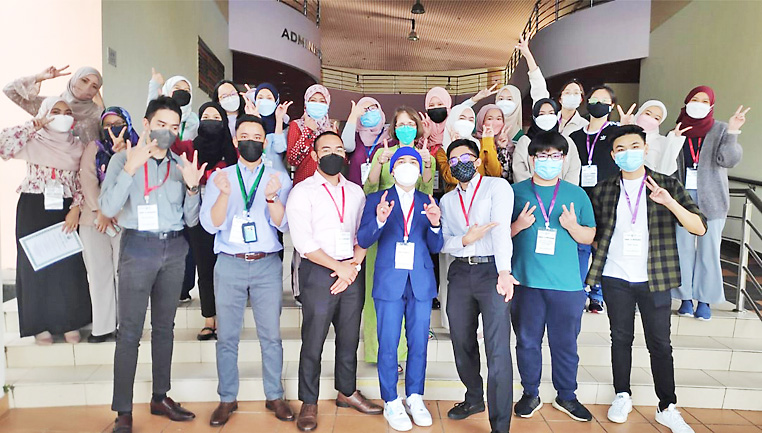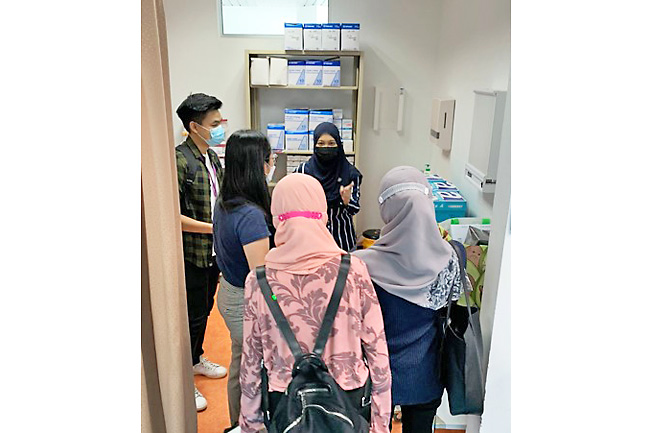Rizal Faisal
Infection of the SARS-CoV-2 virus, which causes COVID-19, provokes immune responses resulting in the production of antibodies with viral-neutralising capacities, and evidence shows that this plays an important role in the prevention of symptomatic clinical diseases.
It is believed that the neutralising antibodies are highly predictive of immune protection against SARS-CoV-2 infection by binding specifically to the viral spike protein, thus blocking viral entry into host cells.
These are the findings of a research conducted in collaboration between Pengiran Anak Puteri Rashidah Sa’adatul Bolkiah Institute of Health Sciences (PAPRSB IHS), Universiti Brunei Darussalam (UBD) with the Ministry of Health of Brunei Darussalam, Duke-NUS Medical School of Singapore and EVYD Technology Sdn Bhd.
Brunei Darussalam implemented the National COVID-19 Vaccination Programme in 2021, whereby most of the population received the first and second doses of COVID vaccines and over 60 per cent received the additional booster dose.
PAPRSB IHS, as one of the leading hubs of health science research in the Sultanate, has completed the first phase of a study measuring the protective immunity of the vaccines administered in Brunei – AstraZeneca, Moderna, Pfizer and Sinopharm – comparing participants’ antibody response to the four vaccine types, and is now embarking on the next phase of the research.


The study’s lead researcher of the study Associate Professor Dr Anne Cunningham announced that the research team had collected 3,000 blood samples from fully vaccinated individuals in January 2022.
Each blood sample was to be measured for neutralising antibodies, which reliably quantifies the protective immunity of antibodies.
According to one of the main researchers of the study Dr Liyana Ahmad, the blood samples from the first phase of the study were analysed in Singapore.
“Duke-NUS Medical School in Singapore developed the virus neutralisation test (cPass) to measure the neutralising antibodies, that’s why the samples have been sent to them for analysis,” explained Dr Liyana.
“The individuals who had participated in the study have been informed of the results of the blood tests via short message service (SMS)”.
She assured that participants wishing to better understand the results of their neutralising antibody analysis can follow a link in the SMS to an online information sheet on how to interpret the test results.
“Those seeking an individual consultation with a doctor may do so by calling the phone number given in the information sheet. The doctor can further advise them on the interpretation of their antibody results,” added Dr Liyana.
Dr Cunningham highlighted that such research will help to develop UBD as the premier national university and build international recognition through the production of quality and relevant research output.
“With the involvement of EVYD Technology, we hope that this research project will act as a starting point towards creating an artificial-intelligence-technology-enabled, coordinated public health surveillance network in Brunei,” said the experienced immunologist, who has been with UBD over the past decade and is the Deputy Dean of the institute. The deputy lead researcher of the study Dr Hazim Ghani explained that study participants from the first phase will be followed up with to measure the durability of neutralising antibodies and their impact on COVID-19 infections.
“In the follow-up phase of our research, individuals from the first phase of the study who had received two doses of their primary vaccination series followed by a recent booster shot may receive an SMS invitation to donate an additional two blood samples. Individuals who had already received the booster dose during the first study may be invited to donate an additional blood sample,” said Dr Hazim.
He added that the invitation is done randomly and only a portion of individuals from the first study would receive an SMS invitation on their phones, for which they have to register online.
Blood collection for the second study phase will take place at the Department of Laboratory Services at Raja Isteri Pengiran Anak Saleha (RIPAS) Hospital.
With data collected from the project, the research team aims to provide crucial information for Brunei to evaluate immune protection on the basis of neutralising antibody levels stimulated by the COVID-19 vaccine programme in Brunei.
In addition, the study seeks to provide important information regarding the immunogenicity of the different types of vaccines.
Overall, the results of this study may assist with national policies of the Brunei Government to shape standard operating procedures in managing COVID-19, including advice on travel policies and national green lane arrangements.


